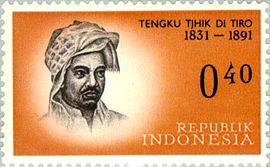Tengku Cik di Tiro
| Teungku Chik di Tiro | |
|---|---|

Drawing of Teungku Chik di Tiro
|
|
| Born |
Muhammad Saman 1836 Tiro, Aceh, Dutch East Indies |
| Died | January 21, 1891 (aged 54–55) Koetaradja, Aceh, Dutch East Indies |
| Cause of death | Consumption of poisoned food |
| Resting place | Meureu, Aceh Besar |
| Nationality | Acehnese |
| Occupation | Religious teacher, guerrilla fighter |
| Children | 5 |
| Relatives | Hasan di Tiro (Great grandson) |
Muhamad Saman (1836 – 21 January 1891), better known as Teungku Chik di Tiro (usually spelt Cik di Tiro in Indonesia), was an Acehnese guerrilla fighter. On 6 November 1973 he was declared a National Hero of Indonesia.
Di Tiro was born to Tengku Sjech Abdullah and Siti Aisyah in Tiro, Pidie, Aceh, Dutch East Indies, in 1836. Until the age of 15, he studied with his father; he then began studying with his uncle, Teungku Chik Dayah Tjut di Tiro. After studying under several more teachers, he moved to Aceh Besar and spent two years there. By day he would study Islam and by night he would join his fellows in fighting against Dutch colonials. He was eventually called home to Tiro, where he began teaching with his uncle.
After several years as a teacher, di Tiro went on the hajj to Mecca. There, he met several Islamic leaders and other revolutionaries from Sumatra, Java, and Borneo; through discussions on imperialism and colonialism, di Tiro became more interested in fighting against the Dutch.
One day in 1880, after di Tiro returned to Tiro, a group of guerrilla fighters came through, looking for an ulama (religious leader) to lead the fight. Di Tiro volunteered and joined the guerrillas in their base in Gunung Miram. He then traveled throughout Aceh. Every time he stopped in a town, he would deliver lectures at a mosque about holy war and how it was their duty to fight against unbelievers. At the same time, he sent letters to other ulama to call them to war, determined to have driven the Dutch out of Aceh by 1883.
Soon di Tiro and the ulama had collected 6,000 soldiers to fight against the Dutch, as well as the support of the Sultan of Aceh. The Dutch, although aware of the impending rebellion, remained unaware of di Tiro's identity. Soon his troops cut communications between Dutch fortresses and established their own base in Mureu. Previous struggles in the 1870s had led the Dutch to double their numbers in Aceh.
...
Wikipedia
